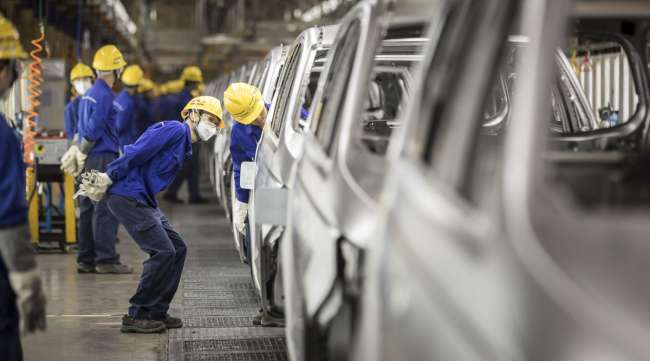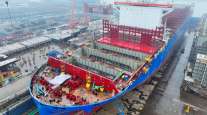China Plant-Closing Cascade May Cost Automakers 1.7 Million Cars

[Stay on top of transportation news: Get TTNews in your inbox.]
Forget about clinging to hopes that China, the world’s largest car market, will recover from its unprecedented two-year slump anytime soon.
Expectations were already bleak as the year began, with IHS Markit predicting a 10% drop in first-quarter production. Now, the influential research firm sees a scenario in which the coronavirus spreading rapidly across the country triggers a cascade of plant closings that lasts into mid-March and reduces output by more than 1.7 million cars — a decline of another 32%.
China’s car sales already were heading for the lowest in at least five years before the outbreak forced authorities to lock down the epicenter city of Wuhan. Now, it’s unclear when consumers will come back to showrooms as 14 provinces and cities that accounted for almost 70% of the country’s gross domestic product shut businesses and factories until at least the second week of February.
“The risks are enormous because of the sheer weight of China in the global market and its importance to trade,” said Jean-Louis Sempe, a Paris-based analyst at Invest Securities. “Predicting the seriousness of the epidemic is very difficult, but there’s no doubt the impact could be huge on factories, supply chains and domestic car sales.”
Though concrete estimates on the financial toll of the coronavirus outbreak are still scarce, it’s clear the final cost will far outweigh that of the 2003 SARS epidemic, when China’s auto market was one-sixth the size it is today and smaller than that of Japan. Companies from Tesla Inc. to Volkswagen AG and Toyota Motor Corp. have warned they anticipate disruptions.
In part one of a two-part exploration of autonomous technology today, our latest RoadSigns podcast revisits conversations with CEOs Alex Rodrigues of Embark and Cetin Mericli of Locomation. Hear them explain what testing automated trucks and developing platooning technology has taught them about the road ahead — and get new perspective with host commentary. Listen to a snippet from Rodrigues above, and to hear the full episode, go to RoadSigns.TTNews.com.
Should passenger-vehicle sales in China fall 20% from last year’s 21.4 million units, that would threaten to end the country’s run as the world’s largest auto market, a rank it has held for more than a decade.
Trauma Ahead
General Motors Co. and Honda Motor Co. are among the manufacturers with factories in the Wuhan region, while state-owned Dongfeng Motor Corp. is headquartered in the city of about 11 million people.
Nissan Motor Co. and Peugeot-maker PSA Group also have assembly plants in Wuhan or the broader Hubei province and are partners with Dongfeng. Robin Zhu, an analyst at Sanford C. Bernstein & Co., singled out Dongfeng PSA as “by far the most exposed” because of the high proportion of vehicles it makes in the area.
“Investors will need to brace for a slowdown in broader activity levels in China,” Zhu said in a Jan. 27 note. “We expect the Chinese auto industry to endure a traumatic next few months.”
Automakers probably will dial back production by 15% in China this quarter after extending holiday shutdowns because of the virus, supplier Aptiv said Jan. 30. Aptiv, whose customers include GM and Volkswagen, expects its own production to be down 11% from a year ago.
The government extended the annual Lunar New Year holiday break — with its workplace closures — by several days to curb potential exposure. Tesla was among the companies saying they’re monitoring potential supply-chain interruptions for cars built outside China, as well.
“This will be horrendous in the supply chain, it’s going to be awful for companies and it will show in their quarterly reports and global strategy going forward,” said Rosemary Coates, a supply chain consultant and executive director of the Reshoring Institute, a nonprofit focused on expanding manufacturing in the U.S. “It’s going to show and it’s going to hurt.”
The epidemic comes at a delicate time for the car industry, which faces sales slumps beyond China, and pressure to make heavy investments in electric and self-driving cars. Compounding the danger for automakers is the overall economic slowdown, with the virus potentially shaving more than 1 percentage point off first-quarter growth in China’s gross domestic product.
EV Impact
China also is the world’s biggest market for electric vehicles. The demand for EVs and traditional premium models will suffer the most because sales of those vehicles are concentrated in the biggest cities, which happen to be the ones most affected by the epidemic, Zhu said.
The effect is felt far beyond the Wuhan region. Tesla expects a potential 10-day delay in production ramp-up at its new Shanghai plant — its first outside the U.S. — because of the government-required shutdown. Chief Financial Officer Zach Kirkhorn said Jan. 29 the delay may also “slightly impact” the company’s profitability this quarter.
GM, Toyota and Volkswagen also closed their plants at least through Feb. 9, taking heed from several provinces that advised companies not to resume operations any sooner than the extended holiday break.
Of mainland China’s 31 provinces, 11 have extended the Chinese New Year holiday period for all nonessential business, including Shanghai, Guangdong, Chongqing and Zhejiang, according to IHS. The provinces are normally responsible for more than two-thirds of the country’s vehicle production. If they’re only idled until Feb. 10, it will cost the industry about 350,000 units of lost production, the researcher projected Jan. 31.
Each month of lost production in China would erode operating profit by about 6.1% at Honda and 11% at Nissan, JPMorgan Chase & Co. estimates. The Chinese operations of Japan-based Aisin Seiki Co. and Koito Manufacturing Co. are among the most exposed to a production stoppage, JPMorgan said in a Jan. 30 note.
Disruptions Abroad
In Germany, Wuhan’s links to the global industry were driven home when auto-parts supplier Webasto AG shut its headquarters in the Munich suburb of Stockdorf after at least four staff members became infected following the visit of a Chinese colleague.
“If work stoppages are extended we could start to see production disruptions in other parts of the world,” said Sig Huber, a senior managing director at the consultancy Conway Mackenzie and former global director of purchasing at Fiat Chrysler Automobiles NV.
Fears about the virus are pressuring foreign governments to repatriate their nationals, and many auto companies have helped with the effort. PSA, Honda and Nissan are evacuating expatriates and their families from the Wuhan area. Most also put limits on travel into China.
While industries such as textiles are able to relocate production quickly, the heavy equipment required in carmaking means it could take auto manufacturers two or three years to move a plant, said Reshoring Institute’s Coates.
“Moving an auto plant or any highly machined products or any sophisticated kind of products — it’s just not gonna happen very fast,” she said. “Even a few days of shutting down a major industrial area like Wuhan is going to affect supply chains around the world.”
Tara Patel, Masatsugu Horie, Chester Dawson and Gabrielle Coppola contributed to this report.
Want more news? Listen to today's daily briefing:





